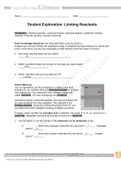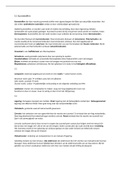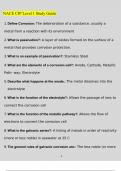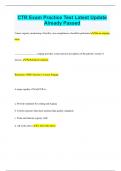¬Lecture 2 – Chapter 2
BASIC OBJECTIVE
To provide financial information about the reporting entity that is useful to present
and potential equity investors, lenders, and other creditors in making decisions
about providing resources to the entity.
• Provided by issuing general-purpose financial statements.
• Assumption is that users need reasonable knowledge of business and financial accounting matters
to understand the information.
Basic Elements
Asset : Present economic resource controlled by the entity as a result of past events.
Liability : Present obligation of the entity to transfer an economic resource as a result of past events.
Equity : The residual interest in the assets of the entity after deducting all its liabilities.
Income : Increases in assets, or decreases in liabilities.
Expenses : Decreases in assets of increases in liabilities.
Basic Assumptions
Economic Entity: company keeps its activity separate from its owners and any other
business unit.
Going Concern: company to last long enough to fulfill objectives and commitments.
Monetary Unit: money is the common denominator.
Periodicity: company can divide its economic activities into time periods.
Accrual Basis of Accounting: transactions are recorded in the periods in which the events
occur.
Basic Principles of Accounting
Measurement principles
Historical cost: Assets and liabilities that are accounted for on the basis of their acquisition price.
Fair value: The price that would be received to sell an assed or paid to transfer a liability at the
measurement date.
Revenue recognition: When a company agrees to perform a service or sell a product to a customer,
it has a performance obligation. Companies are required to recognize revenue in the accounting
period in which the performance obligation is satisfied.
, Accounting Qualities
Relevance: Accounting information must be capable of making a difference in a decision by having
predictive of confirmatory value.
Predictive value: It has value as an input to predictive processes used by investors to form their own
expectations about the future.
Confirmatory value: It helps users confirm or correct prior expectations
Materiality: Information is material if omitting it or misstating it could influence decisions that users
make on the basis of the reported financial information. The information makes a difference or the
company doesn’t disclose it.
Faithfull representation: The numbers and descriptions match what really existed or happened.
Completeness: All the information that is necessary for faithful representation is provided.
Neutrality: A company cannot select information to favor one set of interested parties over another.
Free from error: Information that is free from error will be a more accurate and faithfull
representation of a financial item.
Comparability: Information that is measured and reported in a similar manner for different
companies is considered comparable.
Verifiability: Knowledgeable and independent observers could reach consensus over the stated
numbers and facts.
Timeliness: Information must be available to decisionmakers before it loses its capacity to influence
decisions.
Understandability: The quality of information that lets reasonably informed users see its significance.
BASIC OBJECTIVE
To provide financial information about the reporting entity that is useful to present
and potential equity investors, lenders, and other creditors in making decisions
about providing resources to the entity.
• Provided by issuing general-purpose financial statements.
• Assumption is that users need reasonable knowledge of business and financial accounting matters
to understand the information.
Basic Elements
Asset : Present economic resource controlled by the entity as a result of past events.
Liability : Present obligation of the entity to transfer an economic resource as a result of past events.
Equity : The residual interest in the assets of the entity after deducting all its liabilities.
Income : Increases in assets, or decreases in liabilities.
Expenses : Decreases in assets of increases in liabilities.
Basic Assumptions
Economic Entity: company keeps its activity separate from its owners and any other
business unit.
Going Concern: company to last long enough to fulfill objectives and commitments.
Monetary Unit: money is the common denominator.
Periodicity: company can divide its economic activities into time periods.
Accrual Basis of Accounting: transactions are recorded in the periods in which the events
occur.
Basic Principles of Accounting
Measurement principles
Historical cost: Assets and liabilities that are accounted for on the basis of their acquisition price.
Fair value: The price that would be received to sell an assed or paid to transfer a liability at the
measurement date.
Revenue recognition: When a company agrees to perform a service or sell a product to a customer,
it has a performance obligation. Companies are required to recognize revenue in the accounting
period in which the performance obligation is satisfied.
, Accounting Qualities
Relevance: Accounting information must be capable of making a difference in a decision by having
predictive of confirmatory value.
Predictive value: It has value as an input to predictive processes used by investors to form their own
expectations about the future.
Confirmatory value: It helps users confirm or correct prior expectations
Materiality: Information is material if omitting it or misstating it could influence decisions that users
make on the basis of the reported financial information. The information makes a difference or the
company doesn’t disclose it.
Faithfull representation: The numbers and descriptions match what really existed or happened.
Completeness: All the information that is necessary for faithful representation is provided.
Neutrality: A company cannot select information to favor one set of interested parties over another.
Free from error: Information that is free from error will be a more accurate and faithfull
representation of a financial item.
Comparability: Information that is measured and reported in a similar manner for different
companies is considered comparable.
Verifiability: Knowledgeable and independent observers could reach consensus over the stated
numbers and facts.
Timeliness: Information must be available to decisionmakers before it loses its capacity to influence
decisions.
Understandability: The quality of information that lets reasonably informed users see its significance.










